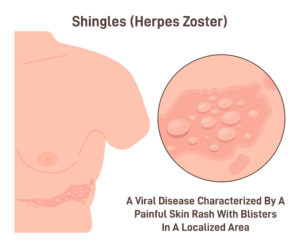 Shingles
Shingles
Shingles, also known as herpes zoster, is an infection of a nerve and the skin around it. It’s caused by the varicella-zoster virus, which also causes chickenpox.
If you have had chickenpox as a child, the virus can lie dormant in the nerves and, when you are run down, it reactivates but usually only along the line of one nerve rather than the whole body.
Find out more about shingles and how it can be treated.
Shingles explained
How do I know if I have got shingles ?
The main symptom of shingles is a burning pain in one area of the body, followed by a red rash that develops into painful itchy bumps and blisters.
Shingles is most common on the upper body or the face, but you can get it on the buttocks and legs as well. If it affects your face around the eye and your eye becomes painful it is important to speak to a doctor urgently about this.
Sometimes shingles causes symptoms that develop a few days before the painful rash. This includes symptoms like:
- headache
- burning, tingling, numbness or itchiness of the skin in the affected area
- a feeling of being generally unwell
- a high temperature (fever)
The shingles rash usually appears on one side of your body. It develops on the area of skin related to the affected nerve. It can be itchy and sore but sometimes it is so painful that even a breeze will make the burning sensation worse.
New blisters can appear for up to a week. A few days after appearing they become yellowish in colour, flatten and scab over.
The pain from the inflamed nerve (neuralgia) can last for months if not treated early, so it is important to get treatment as soon as possible.
In very rare cases, shingles can affect the nerve to the face and ear. If you have any sudden hearing loss, contact your GP immediately or attend A & E if you have new weakness in the muscles of the face.
What treatment is available?
Oral Antiviral tablets can reduce the severity of symptoms, shorten the attack, and reduce the risk of ongoing nerve pain. These are most effective if started within 3 days of the rash appearing.
What should I do if I think I have shingles?
Contact your GP surgery as soon as possible and tell the reception staff that you think it is shingles and you need the treatment as soon as possible. This will help the staff to book you in with a team member who can prescribe for you.
If it affects your face around the eye and your eye becomes painful it is important to speak to a doctor urgently about this.
If your GP surgery does not book you an appointment, 111 should be able to book you with an urgent treatment centre appointment.
If you can’t get any appointments, please call the Trust on 01480 474074 and speak to one of the medical advisers.
Acyclovir is the most common anti shingles treatment. You have to take it 5 times a day, but it is worth doing this to reduce the pain and shorten the attack.
Am I contagious if I have shingles?
Shingles is less contagious than chicken pox and, if you feel well enough, you can go out and about. You should avoid being in contact with pregnant ladies, babies under 1 month of age and anyone with low immunity until all the blisters have scabbed over.
I’ve heard about the Shingles Vaccine - when can I have this?
The shingles vaccine has changed in 2024. You will now be called by your GP surgery on or after your 65th birthday.
It is not a live vaccine, so it can’t give you either shingles or chicken pox.
You will need 2 doses of Shingrix vaccine, with a 6-12 month gap between the two doses.
There is a catch-up vaccination programme starting in early 2024. If you have already turned 65 and have not yet been called, your GP surgery will be working through their list, and you will be called as soon as they have availability of the vaccine.
If you have a severely weakened immune system because you are on medication that affects this, you may be called for your vaccines before your 65th Birthday and have a shorter gap between the two doses.
The vaccine reduces your chance of getting shingles and, if you do still get it, should make the attack much shorter and less painful.
Further information
If you would like more information support is available from the Trust's medical advisers. contact them on 01480 474074 or by email.
You can also find more information from the organisations below.


